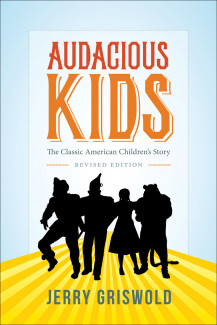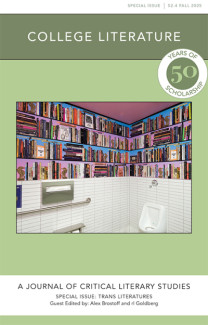
Johns Hopkins UniversityEst. 1876
America’s First Research University
The Legend and Literature of Tarzan

Directed by David Yates and starring Alexander Skarsgård as the ape-man, The Legend of Tarzan (Warner Brothers) is a movie meant for the Summer of 2016 but it is also one more incarnation of a timeless and familiar story. Jerry Griswold considers the Tarzan Myth in his Audacious Kids: The Classic American Children’s Story, from which the following remarks are excerpted:
First appearing in All Story Magazine and then published as a book in 1914, Tarzan of the Apes immediately jumped on to the bestseller lists and has remained an enduring favorite. Among those who have singled it out for special praise have been Ronald Reagan, Ray Bradbury, Gore Vidal, and Arthur C. Clarke. In the years which followed, readers would demand some twenty-five sequels from Burroughs. The statistics are staggering: by 1970, for example, there were more than thirty-six million Tarzan books in print in thirty-one languages; in addition, there have been more than fifty Tarzan films (from the countless Saturday matinees where Johnny Weissmuller let out his famous Tarzan yell to the more recent incarnations like “Greystoke” and “George of the Jungle”). Surveying all of American culture, scholar Russel Nye concluded, "Tarzan remains the greatest popular creation of all time."
Burroughs' private dream spoke to millions of readers and became a shared dream, a public dream, a myth. Burroughs offered to take us Back, to the fierce Origin, to the "wild" and "hairy." That means loincloth nakedness! Strip away the accretions of civilization. And that means apocalyptic truth! Frank admission of the fact that, at bottom, we are basically animals--fiercely competitive, concerned only with our own survival. Beneath politics and good manners lies sex and the wish for dominance. Rationality is only a fragile lid covering a more potent and fundamental stew of drives, impulses, and passions. And that means freedom! From restrictions, rules, and concern for others. From the pettiness of office politics and civilized bureaucracies. Here is unchecked and untrammeled egotism. Here, only the fittest survive. Finally, what are we at the bottom? After the Bomb has fallen, after we have been stranded on an island, in extremis? What would we really be like? Burroughs finds his answer-at-the-bottom in the realms of Darwin and Freud.
As much as Burroughs borrowed from legends about the Wild Child and from Kipling's Mowgli stories, he made an important departure from tradition when he had Tarzan raised by apes instead of wolves. Seeking his own set of origins, Burroughs followed Darwin's lead in Origin of Species. Burroughs' Darwinism is hardly sophisticated. Instead, he seems to have got many of his ideas from loose talk and popularizations of the naturalist's ideas that appeared in newspapers and magazines (which bandied such terms as "survival of the fittest" and "evolution" and "lower orders"); from the propositions advocated by Social Darwinians and others keen on eugenics; and from discussions evoked by the Scopes Monkey Trial, on which Burroughs himself commented.
On the appeal of Tarzan, Burroughs said: “We wish to escape the narrow confines of the city streets [the restrictions of man-made laws and the inhibitions that society has placed upon us] for the freedom of the wilderness,” Burroughs called himself a "subconscious" writer and added, “Psychologists tell me that, as the subconscious does not reason, too close a scrutiny might prove anything but flattering." Indeed, when Burroughs opens his Pandora's box, what spills out in his books are a number of sordid things: hostility to anything "other," manifested in blatant racism and sexism; voyeuristic and sadomasochistic erotics, where white women often seem to be in danger of "the fate worse than death" at the hands of hairy brutes while the hero looks on from concealment with his knife or sword in hand; and, most conspicuously, the wish for dominance, evident in the anti-social behavior of this solitaire and self-made man who is pictured in retrograde fantasies of self-importance which sometimes make Tarzan seem kin to comic-book characters like Superman and the Hulk. Here, then, is no repression or embarrassment. Here comes spilling out all the violent and erotic fantasies of the white male. Here, unchecked, is naked id.
Following Rider Haggard, Burroughs made Africa the locale for this physical and psychological nakedness. It is, of course, an "Africa" that has no objective correlative. At one point, for example, Tarzan pelts a tiger (an animal found only on the Indian subcontinent) with a pineapple (a fruit found in the Caribbean and now grown in Hawaii). Still, it is worth noting that, though the movies based on the books took even greater liberties with facts, Hailie Selassie made one request of America when he became the Emperor of Ethiopia: that Hollywood send him all of the Tarzan films. Burroughs' books, to say this differently, while not true to facts, are true to the Dream of Africa. This is the Africa of Freud, the "Absolute Elsewhere," the Dark Continent.
In the second half of the novel, the civilizing of Tarzan begins when he develops an interest in Jane Porter, an American woman stranded in the jungle. Tarzan rescues her from his ape stepbrother who abducted the maiden and planned to rape her. When Tarzan carries Jane off, his motives are no different. Then suddenly and unbelievably, something else happens. Tarzan's English DNA begins to crackle with communiques about "acting like a gentleman." Here Burroughs makes a stretch, suggesting that Tarzan's evolution continues more or less seamlessly into his becoming civilized--as if the rise of morality is coextensive with natural selection; as if the ultimate victor in "the survival of the fittest" would not only be the strongest, but the most ethical; as if, say, every professional football player would also perforce be a paragon of deportment. When Burroughs suddenly has Tarzan's DNA send him messages about ethics and fair play--and hastily explains Tarzan's innate knowledge of Moses' Ten Commandments and Emily Post's Book of Etiquette as a genetic bequest coming from generations of fine breeding among English aristocracy--Darwin meets Rousseau in fantasyland, and natural selection suddenly becomes equated with natural nobility.
One of the books in Burroughs' library was his copy of Darwin's Descent of Man, first purchased when he was twenty-three and on the flyleaf of which he doodled a picture of an ape and captioned it "Grandpa." In that work Burroughs would have read Darwin saying, "The wonderful progress of the United States and the character of its people are the results of natural selection; for the more energetic, restless and courageous men from all parts of Europe have emigrated during the last ten or twelve generations to that great country and have succeeded there best." It’s significant that Tarzan ends in the United States–in other words, as far as progress has taken human beings by the early part of the twentieth century. In this book, the word "natural" (natural nobility, natural selection) seems about to being slurred to sound like the word "national" (viz. national nobility, national selection).
Jerry Griswold is professor emeritus of literature at San Diego State University and former director of the National Center for the Study of Children’s Literature. He is the author of seven books, including Audacious Kids: The Classic American Children’s Story and Feeling Like a Kid: Childhood and Children’s Literature, both published by Johns Hopkins University Press.


